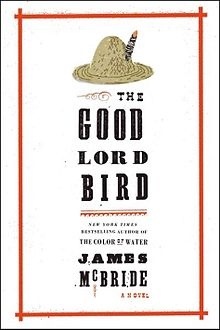One-sentence plot
A recounting of John Brown’s abolitionist activities, as seen over the years through the dispassionate eyes of a fictional young slave he freed.
The review
I cannot remember a more fascinating book discussion than when I sat down to discuss The Good Lord Bird at my book club last week and found out I hadn’t understood it at all. I like book clubs because they introduce me to literature I never would have come across otherwise, and force me to persist when I’m not keen on something. I think it expands my mind as a reader. And I wouldn’t necessarily have chosen The Good Lord Bird of my own volition. But I read it. I enjoyed the story of young Henry/ Henrietta, a boy who is ‘freed’ from his slave owner by John Brown, mistaken for a girl, and absorbed into John Brown’s band of renegade abolitionists as they storm around Kansas haplessly getting into battles, and eventually attempt a grand raid. I read it. I found the story reasonably interesting. I thought the characters a little bland, the story a little slow, the writing quite good. I enjoyed it but wouldn’t have rushed to recommend it. Then I got to book club and someone’s first comment was that it was a hilarious and edgy satire. And I was completely dumbfounded.
Now according to the Americans in my book club, all the Americans reading this blog are probably very familiar with this story and its protagonists. And so, when reading it, they would find this bold, irreverent new depiction of John Brown, Frederick Douglas et al, very funny and almost scandalous. As someone without more than a basic grounding in American history (and honestly, I’d never heard of John Brown or the others), all of this side of the book went right over my head (and the heads of other non-Americans in the group). Rarely have I been so oblivious to the intention of the author. I had to entirely recast my opinion of the book, as it was clearly a lot more clever and complex than I had given it credit for. As my fellow book clubbers explained the context, and American feeling and standard depictions of these beloved historical characters and events, I started to get it. And yes, it does indeed seem to be a clever and witty, almost risqué piece of work. Even though I personally didn’t laugh once and had no idea of its controversial approach.
I wonder – can a book like this be considered generally excellent, even if its main intention only stands up in the context of readers familiar with the details of American history and its cultural depictions, and is lost on more general readers? Or is it marred by provincial conceit? I don’t know. It’s interesting that I was going to give the book 4/5 before I found out about the satire element. That says something about the book’s ability to stand alone without the history. So the 4/5 rating shall stand, with the caveat that I didn’t really get it – but even so, it was engaging and largely well written. If you don’t know your American abolitionist history though, you might want to think twice about this one…
The verdict: 4/5


I’m an American and I definitely got the satire, whether it was “edgy” or not. I wasn’t all that impressed with the book except for the beginning and then again toward the end. I got tired of the dialogue and I thought “Onion” and his adventures just a bit too silly – although possibly good movie material.
Otoh, the characters and places are almost entirely verifiable in the historical records of the times. And it seemed to me that John Brown was always treated with respect, not like a whacko as is sometimes done.
Another thing, and possibly allowing for the satire, is that the author, James McBride, is black. I’ve read two or three books about John Brown, fiction and non-, but never from a Black point of view. To me, that made it more interesting, especially toward the end where the free Blacks who joined Brown were involved.
Thanks for an interesting review.
LikeLike
Great perspective, thanks Becky! I hadn’t realized James McBride is black. Another layer to a very interesting book whose layers I failed to appreciate! I agree that all the battle stuff in the middle got tedious. I only started enjoying it properly when he arrived at the whorehouse.
LikeLike